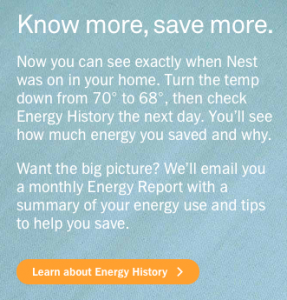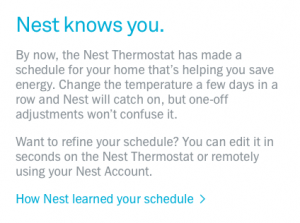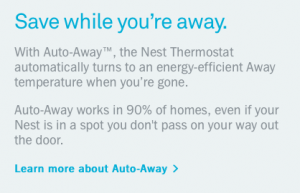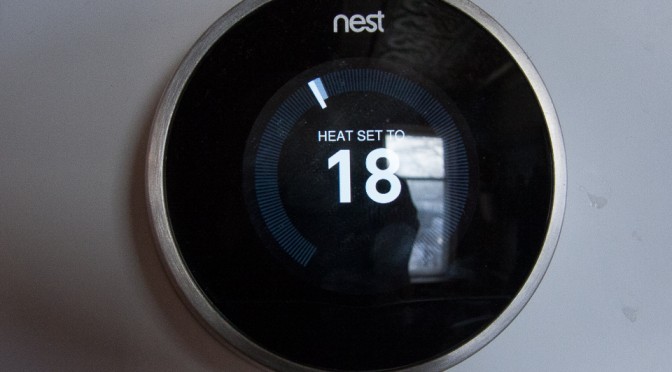Being the loving, thoughtful, sensitive, unselfish, supportive – not to mention smart and beautiful – wife that I am, I bought Husband a Nest programmable thermostat last Father’s Day. High on his list of wants, but non-existent on mine, I caved to the (arguably gratuitous) technology purchase because gift-giving is about the other person and marriage is all about compromise, right?
In our running joke, I am the technological Luddite in contrast to his tech savvy marvel. Truth is, it’s both his natural inclination and his business to be Mr. Smartypants about such things. I (generally) try to keep my mouth shut and appease his need for trinkets because his expertise serves me well. But I can’t resist trying to drag him over to the dark side. For Christmas I considered dressing up like a SmartPhone to get his undivided attention, but I gave him this weather app instead:
Want to know the weather? I ask him. Look out the window. Does this make me a Luddite or a comedienne?
The “real” Luddites were 19th-century English textile artisans who protested against newly developed labour-saving machinery that threatened to replace them with less-skilled, low-wage labourers, putting them out of work. ((http://en.wikipedia.org/wiki/Luddite)) Raging against the machine due to unemployment, poverty and starvation seems reasonable to me.
The word evolved into a pejorative, a cheap counter-argument, and a name-calling extravaganza. It has come to describe someone resistant to change, someone being left behind in the old ways. Redundant. Useless. Uncool. It plays perfectly to our most profound fears. Engineer James Miccolis has this to say:
But is opposing change and preferring older technology really a bad thing? Is newer always better – or is that just a sales pitch and a way of avoiding a real discussion of the issues?
Should those who do pencil drawing, watercolors, oil painting, etc., be derided as Luddites because they don’t use a computer application or a digital camera? [Or]…those who have fireplaces in their homes…because they don’t use the latest in heating technology?
Should those who oppose changes in things like zoning laws, building codes, etc., be derided as Luddites because they’re trying to avoid change in their neighborhoods?
What does one have to do to not be a Luddite in some way ((https://www.eham.net/ehamforum/smf/index.php?topic=66130.0))
To keep it simple let’s skip the labels and just say that my interests are less techno-centric. I expect technology to serve me, and not the other way around, and I prefer to spend my finite resources in ways that maximize my pleasure, like travel, building materials, art, learning and books. These are my ideas of fun, however uncool they may be.
So what exactly is this kind of home automation and is it good, bad or neutral? Screen shots from the Nest website expound on the product benefits: simplicity, flexibility, connectivity and saving money: 




Nest knows you, they say. Sounds creepily like the jolly fat man that slips down your chimney unseen every year. I asked Husband why he’s so excited about it. He says it reflects a natural (and obvious) product evolution and business opportunity:
How can something that controls the temperature in the house – something that controls a single, isolated factor by telling a large appliance to turn on or off – remain so incredibly stupid in the programming for so many years? Now, with all of the advances in computing – we can simulate a mission to the stars, fight as multiple characters against endless hordes of zombies, replicate the intricate physics in any professional sport, and create vast worlds where we interact online – yet we are still limited to controlling home temperature by 4 settings a day for weekdays and weekends separately.
It’s revolutionary, I get that. But why is it a need and not a fancy want?
I can change the temperature from anywhere in the house (I always have a WiFi device nearby) and all that data, like when the furnace turns on and off, what the temperature setting was, what it should be and how long, based on the outside temperature and heating qualities (as learned by the unit) of the house, it can take to reach a target temperature based on the current one. All of that is useful information. Would we set the temperature to 20 Celsius if the thermostat thinks it will take 2 hours of non-stop cooling because our house is older and the outside temperature is 43 and inside we are at 28? Maybe we’ll stop at 25, or 24. It will tell us how long it should take.
Useful information. Husband isn’t alone in identifying data mining as a key benefit. On 13 January, 2014 Google bought Nest for $3.2 billion dollars. Who would have imagined, just a few years ago, that thermostats, and C02 monitors, could be that valuable?
[pullquote]The paramount value of the devices, in a sense, lies not in the hardware itself but the interconnectedness of that hardware. As the devices talk to each other, by building an aggregate picture of human behavior, they anticipate what we want before even we know. ~ Marcus Wohlsen [/pullquote]
Marcus Wohlsen at Wired.com (“What Google Really Gets Out of Buying Nest for $3.2 Billion”) offers insight on what both parties are getting out of the deal. Google is already king of big data, monetizing the traces we leave behind when we use connected devices. But, he states, they have been unable to capture the ‘data’ of human behaviours when we engage in activities apart from our screens. “That,” he says, “In theory changes with Nest.”
The future of hardware isn’t better versions of the same standalone tech. It’s what you can create when you take all the smarts of the smartphone and build them into everything else…The paramount value of the devices, in a sense, lies not in the hardware itself but the interconnectedness of that hardware. As the devices talk to each other, by building an aggregate picture of human behavior, they anticipate what we want before even we know.
Nest plans to expand it’s product offerings beyond the programmable thermostat and its Nest Protect C02 detector, focussing on the creation of “conscious homes.” It is the Internet of Things.
*******
I write this post and leave another trace. The web has been supremely helpful and it’s difficult to imagine living without it. But I think there is plenty of technology that we can live without. Nest is one of them.
I want to see, feel, reason and process life as much as I can for myself without technological and corporate intervention. I’ll put on a sweater when I’m cold, open a window when I’m hot, and adjust the thermostat when I leave. I don’t find using my brain in this way “complicated or irritating.”
But I’m not the only decision-maker in the household, am I?


2 responses to “A Luddite Wife, Her Techie Husband and the Nest”
Phew, I thought my internet-connected Withings Scale that sits quietly in our bathroom doing all the heavy lifting work was going to get dragged into this.
Luckily it was spared as it might not have weathered the argument quite as well
Bastard. I forgot about the scale. On the upside, I’m still the same weight as when you married me so share away.
BTW, did you say you were having a problem with your iPhone resetting itself continuously? Just wondering. Don’t worry about it, I’m sure it’s nothing. Really.